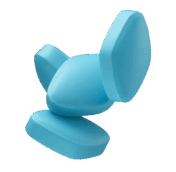Sometimes Viagra does not work as well as expected, and this can happen for several common reasons:
The dosage
Viagra comes in three strengths:
- 25mg – the lowest dose
- 50mg – the standard starting dose
- 100mg – the highest dose
Most men begin with 50mg. If this is not effective, speak to your prescriber about whether 100mg is suitable for you. If you are already on the 100mg dose, you will not be able to increase it further, as this is the maximum daily amount.
Further reading: Viagra dosages
Lack of arousal
Viagra will not work unless you are sexually aroused. If you are struggling with low libido, speak to your GP; conditions such as depression, stress, or diabetes can affect your sex drive.
It can also help to have an open conversation with your partner. Improving emotional closeness often leads to better sexual arousal and performance.
Taking it too early
Viagra is most effective when taken around one hour before sex. Its effects last for roughly four hours, so if you take it too early, the effects may start to wear off before you engage in sexual activity.
Taking it too late
Trying to have sex immediately after taking Viagra is also unlikely to work. Your body needs time to absorb it, so taking it about an hour beforehand gives you the best chance of success.
Further reading: How long does Viagra take to work & how long does it last?
Eating a heavy, high-fat meal
Viagra absorbs best on an empty stomach. A heavy or high-fat meal can slow digestion and reduce how much of the medication enters your bloodstream.
For the best results, avoid fatty meals and try to wait a couple of hours after eating before taking your ED treatment.
Alcohol
Drinking too much alcohol can make Viagra less effective. Alcohol is a depressant that slows down your nervous system and reduces blood flow to the penis, making it harder to get or maintain an erection even with medication.
For best results, keep alcohol intake low when you plan to take Viagra.
Further reading: Alcohol and Viagra
Psychological factors
ED does not just have physical causes – psychological factors can have a major impact too.
Stress, anxiety, relationship issues, performance pressure, or general worry can all interfere with sexual arousal.
Even if Viagra is physically working to improve blood flow to the penis, psychological barriers can stop you from becoming fully aroused, making it seem like the medication is not working.
Further reading: Is ED psychological or physical?
Underlying health conditions
Certain health conditions can reduce the effectiveness of any erectile dysfunction treatment – not just Viagra.
Conditions such as:
- Diabetes
- High blood pressure
- Heart disease
- High cholesterol
- Obesity
- Hormone imbalances
- Nerve damage
These issues can affect blood flow, nerve function, or hormone levels, all of which are essential for erections.
If these conditions worsen or are not well controlled, ED medication is less likely to work reliably.
You’re simply having an “off day” (it’s normal)
Even when everything is done correctly, you may find that Viagra is not working.
Fatigue, stress, poor sleep, a busy mind, or just not feeling in the mood can all affect sexual performance.
These temporary factors can reduce arousal and make erections harder to achieve, even with ED medication.
An occasional off day does not mean Viagra is not working or that something is wrong. Most men experience this from time to time, and things usually return to normal without needing to change your treatment.




